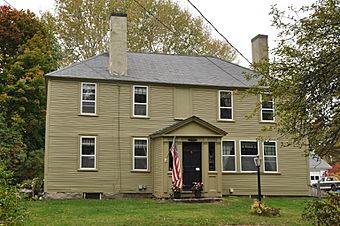Robert Rose Tavern facts for kids
Quick facts for kids |
|
|
Robert Rose Tavern
|
|
 |
|
| Location | 298 Long Sands Rd., York, Maine |
|---|---|
| Area | 2 acres (0.81 ha) |
| Built | 1680 |
| Architectural style | Colonial, Federal |
| NRHP reference No. | 75000206 |
| Added to NRHP | October 10, 1975 |
The Robert Rose Tavern is a very old house in York, Maine. It was built in the 1750s, but it used parts from an even older house from 1680! This makes it one of the oldest public places to stay in Maine.
The first house was built by John Banks, who was one of the first people to settle in York. Later, a well-known local businessman named Robert Rose turned it into a tavern. Today, it's a private home. This historic building was added to the National Register of Historic Places in 1975 because of its important history.
Contents
What Does the Robert Rose Tavern Look Like?
The Rose Tavern is found at the end of a long private road. This road is off Long Sands Road in York. The building is made of wood and has two stories. It is shaped like the letter "L".
It has a special roof called a hip roof. The outside walls are covered with clapboard siding. The foundation, which is the base of the house, is made of granite.
The Front of the Building
The front of the house faces east. It looks mostly the same on both sides. There are five sections, or "bays," across the front. The main door is in the middle.
This door is inside a small, gabled porch that sticks out. The door has narrow windows on its sides. These side windows are separated from the door by thin, flat columns called pilasters.
Inside, the house has a central hallway. The original staircase is still there. You can also see old wooden decorations from the late Georgian and Federal periods.
A Long and Interesting History
The land where the tavern stands was first given to John Banks. John was the son of Richard Banks, who settled in York in 1642. John Banks was born in York in 1657.
The First House (1680)
John Banks built his house in 1680. He and his house survived a difficult event in 1692. His father and two brothers did not survive this event. John's house was probably safe because it was built far away from the beach.
From House to Tavern (1756)
In 1756, a man named Robert Rose bought the Banks property. He built the current house as a big addition to John Banks's 1680 house. Only small parts of the old frame and foundation from the 1600s remained.
Robert Rose ran the tavern until 1782. He was very involved in the local community. He often hosted meetings for the town's leaders. He also earned money by working as the person who looked after the local jail.



